MGM466: ProServe Training Effectiveness Evaluation and Recommendations
VerifiedAdded on 2023/05/30
|10
|2495
|473
Report
AI Summary
This report evaluates the effectiveness of the ProServe training program in reducing alcohol misuse among youths and adults. It formulates a hypothesis that ProServe training is effective in reducing alcohol use and examines empirical evidence supporting and opposing this hypothesis. The report discusses the variables involved, including the reduction of alcohol use as the independent variable and the effectiveness of ProServe training as the dependent variable. While some studies suggest the effectiveness of training programs and psychotherapy in reducing alcohol addiction, others argue that factors like depression, anxiety, and lack of sleep contribute more significantly. The report also addresses the implications of the findings, recommending a deeper understanding of causal factors and consideration of age-related factors in program design. It concludes that ProServe training is effective but requires continuous improvement and adaptation to address the evolving challenges of alcohol misuse, recommending complete understanding of causal factors related to alcohol addiction and age factors are important to make an effective measure. The document is available on Desklib, a platform offering study tools and solved assignments for students.
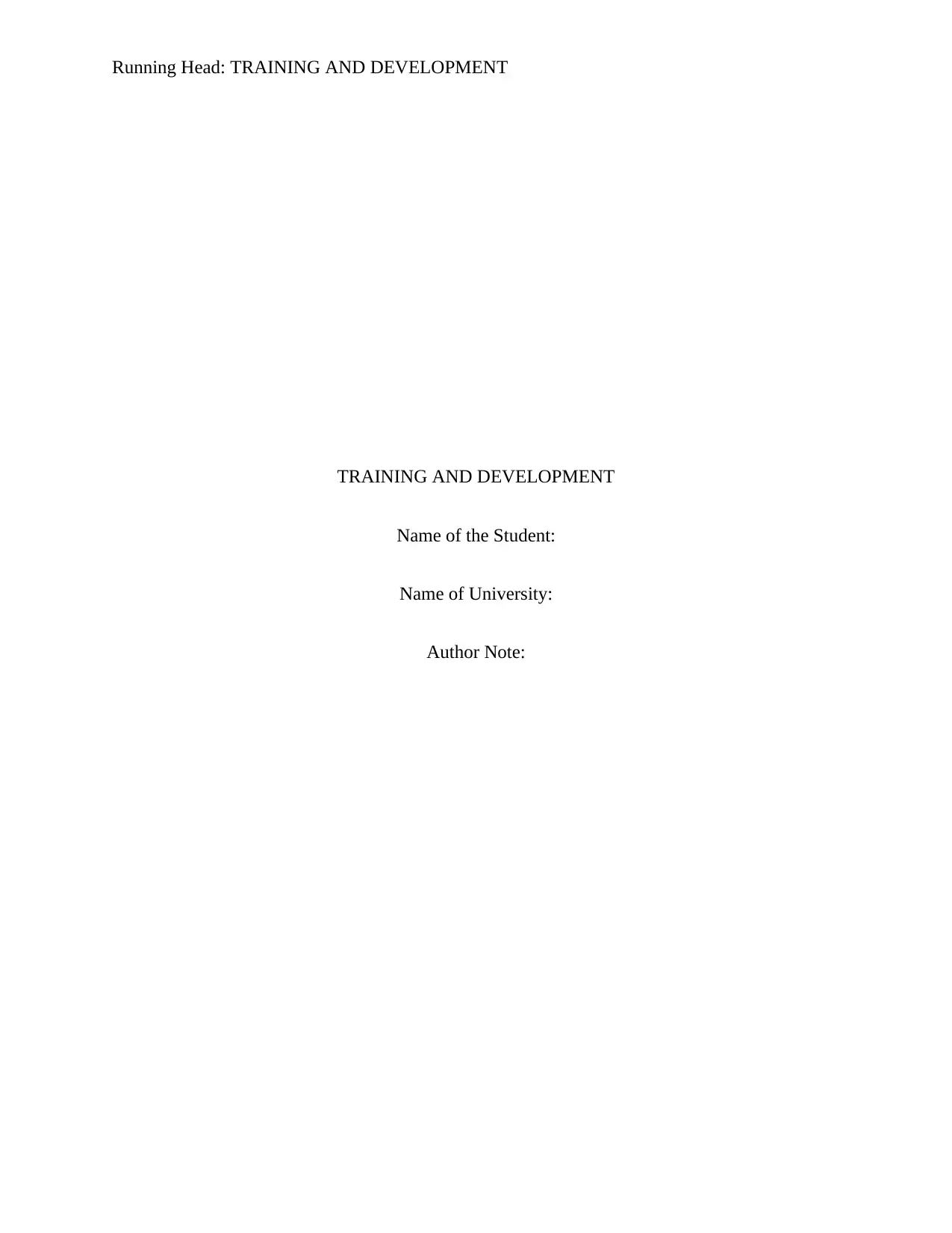
Running Head: TRAINING AND DEVELOPMENT
TRAINING AND DEVELOPMENT
Name of the Student:
Name of University:
Author Note:
TRAINING AND DEVELOPMENT
Name of the Student:
Name of University:
Author Note:
Paraphrase This Document
Need a fresh take? Get an instant paraphrase of this document with our AI Paraphraser
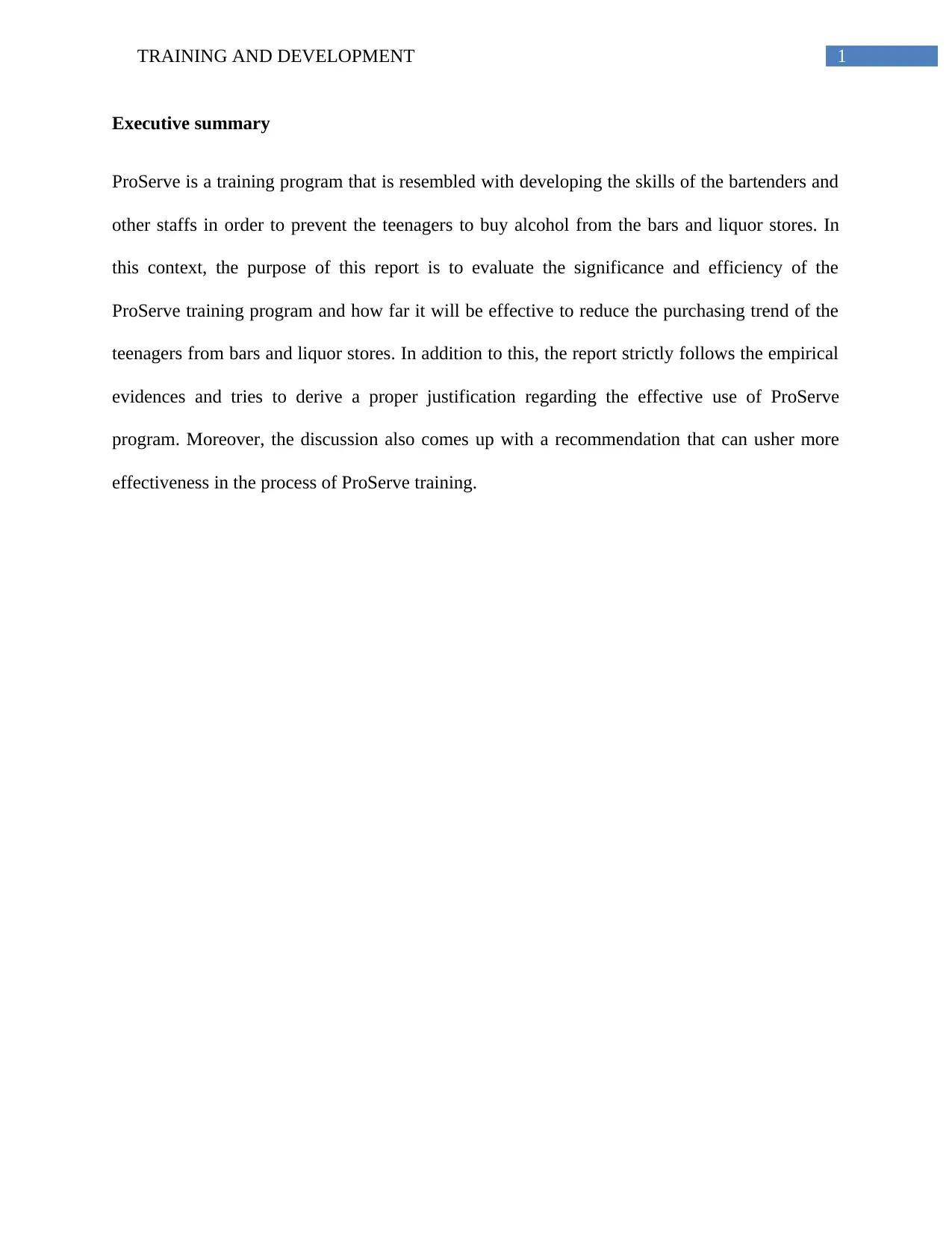
1TRAINING AND DEVELOPMENT
Executive summary
ProServe is a training program that is resembled with developing the skills of the bartenders and
other staffs in order to prevent the teenagers to buy alcohol from the bars and liquor stores. In
this context, the purpose of this report is to evaluate the significance and efficiency of the
ProServe training program and how far it will be effective to reduce the purchasing trend of the
teenagers from bars and liquor stores. In addition to this, the report strictly follows the empirical
evidences and tries to derive a proper justification regarding the effective use of ProServe
program. Moreover, the discussion also comes up with a recommendation that can usher more
effectiveness in the process of ProServe training.
Executive summary
ProServe is a training program that is resembled with developing the skills of the bartenders and
other staffs in order to prevent the teenagers to buy alcohol from the bars and liquor stores. In
this context, the purpose of this report is to evaluate the significance and efficiency of the
ProServe training program and how far it will be effective to reduce the purchasing trend of the
teenagers from bars and liquor stores. In addition to this, the report strictly follows the empirical
evidences and tries to derive a proper justification regarding the effective use of ProServe
program. Moreover, the discussion also comes up with a recommendation that can usher more
effectiveness in the process of ProServe training.
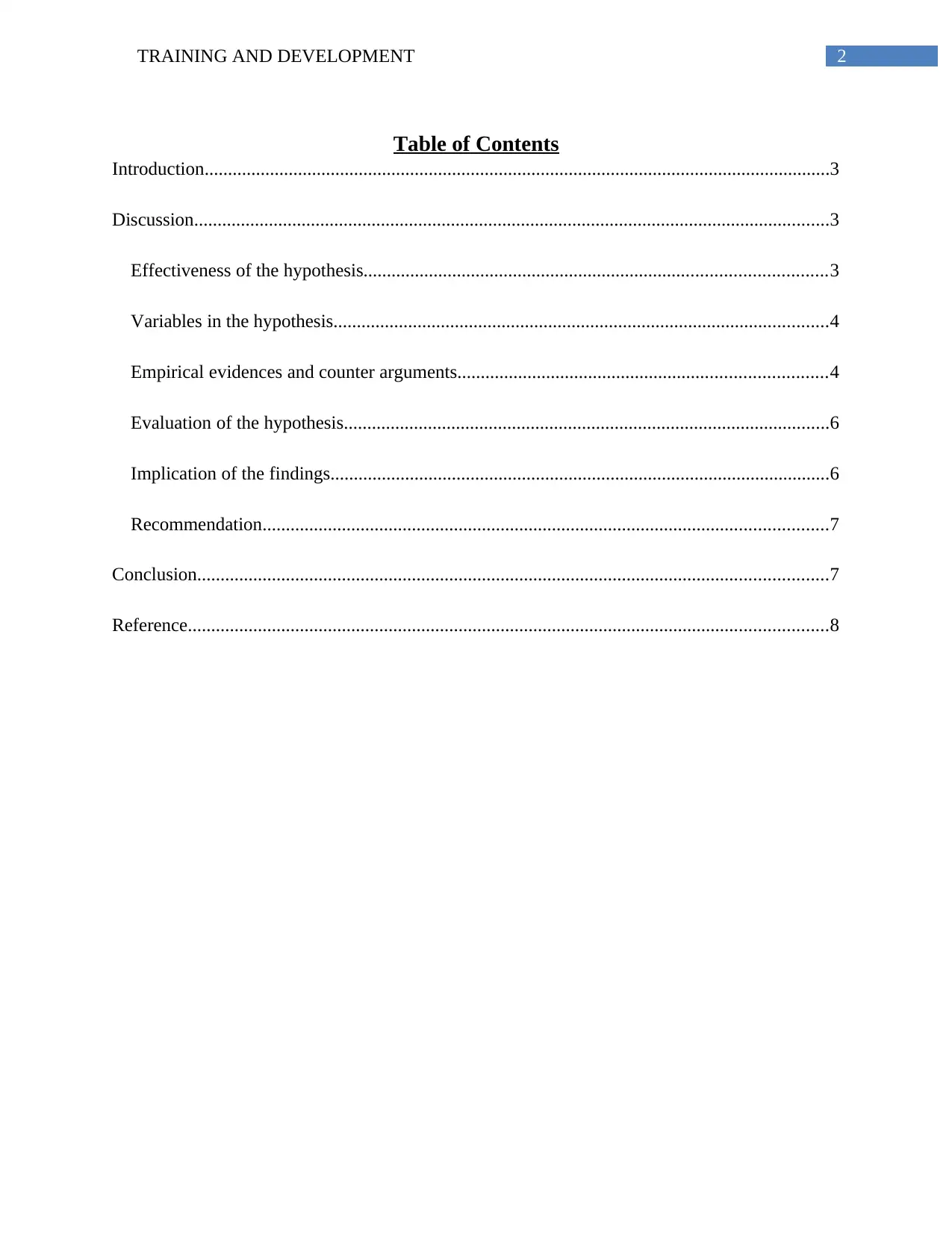
2TRAINING AND DEVELOPMENT
Table of Contents
Introduction......................................................................................................................................3
Discussion........................................................................................................................................3
Effectiveness of the hypothesis...................................................................................................3
Variables in the hypothesis..........................................................................................................4
Empirical evidences and counter arguments...............................................................................4
Evaluation of the hypothesis........................................................................................................6
Implication of the findings...........................................................................................................6
Recommendation.........................................................................................................................7
Conclusion.......................................................................................................................................7
Reference.........................................................................................................................................8
Table of Contents
Introduction......................................................................................................................................3
Discussion........................................................................................................................................3
Effectiveness of the hypothesis...................................................................................................3
Variables in the hypothesis..........................................................................................................4
Empirical evidences and counter arguments...............................................................................4
Evaluation of the hypothesis........................................................................................................6
Implication of the findings...........................................................................................................6
Recommendation.........................................................................................................................7
Conclusion.......................................................................................................................................7
Reference.........................................................................................................................................8
⊘ This is a preview!⊘
Do you want full access?
Subscribe today to unlock all pages.

Trusted by 1+ million students worldwide
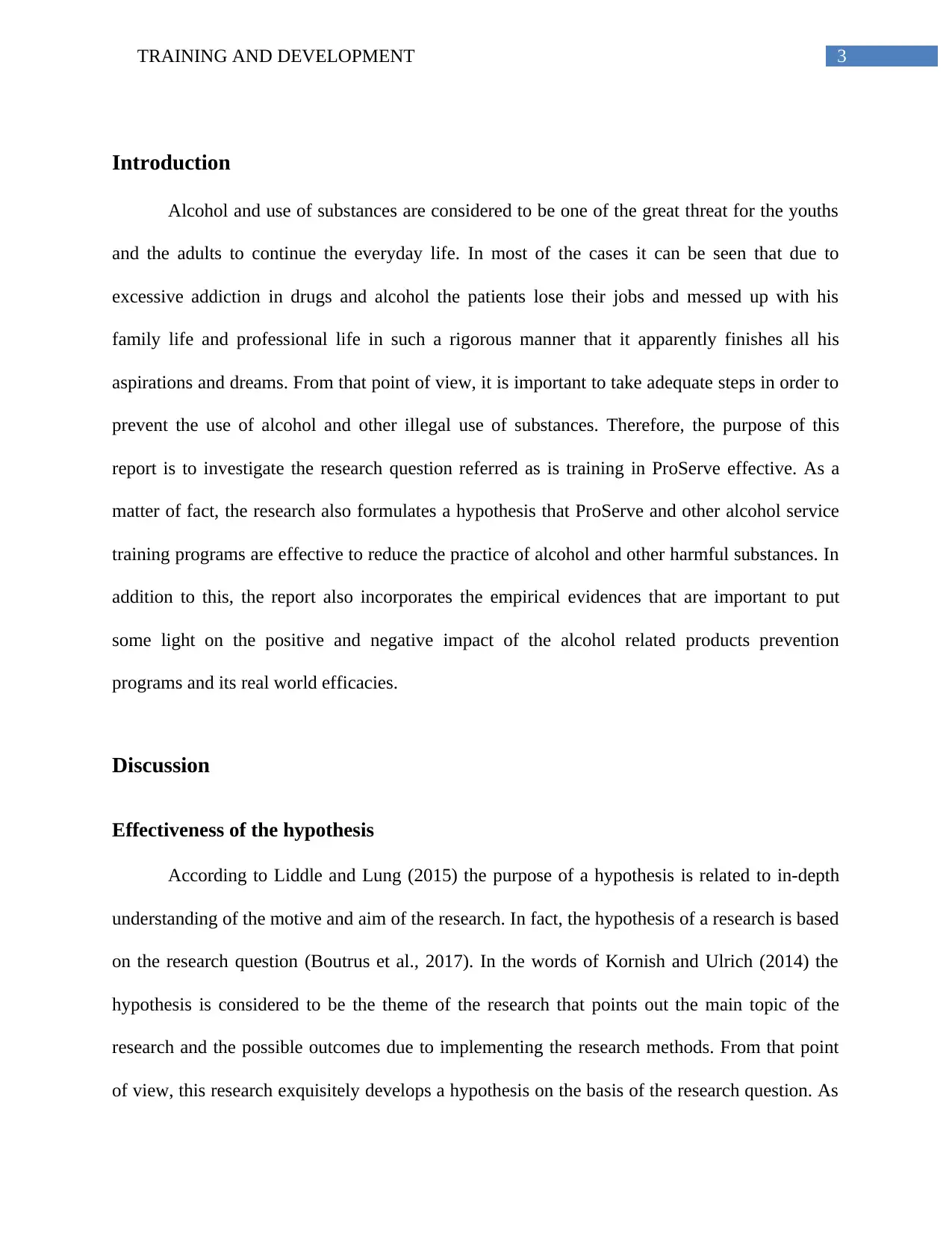
3TRAINING AND DEVELOPMENT
Introduction
Alcohol and use of substances are considered to be one of the great threat for the youths
and the adults to continue the everyday life. In most of the cases it can be seen that due to
excessive addiction in drugs and alcohol the patients lose their jobs and messed up with his
family life and professional life in such a rigorous manner that it apparently finishes all his
aspirations and dreams. From that point of view, it is important to take adequate steps in order to
prevent the use of alcohol and other illegal use of substances. Therefore, the purpose of this
report is to investigate the research question referred as is training in ProServe effective. As a
matter of fact, the research also formulates a hypothesis that ProServe and other alcohol service
training programs are effective to reduce the practice of alcohol and other harmful substances. In
addition to this, the report also incorporates the empirical evidences that are important to put
some light on the positive and negative impact of the alcohol related products prevention
programs and its real world efficacies.
Discussion
Effectiveness of the hypothesis
According to Liddle and Lung (2015) the purpose of a hypothesis is related to in-depth
understanding of the motive and aim of the research. In fact, the hypothesis of a research is based
on the research question (Boutrus et al., 2017). In the words of Kornish and Ulrich (2014) the
hypothesis is considered to be the theme of the research that points out the main topic of the
research and the possible outcomes due to implementing the research methods. From that point
of view, this research exquisitely develops a hypothesis on the basis of the research question. As
Introduction
Alcohol and use of substances are considered to be one of the great threat for the youths
and the adults to continue the everyday life. In most of the cases it can be seen that due to
excessive addiction in drugs and alcohol the patients lose their jobs and messed up with his
family life and professional life in such a rigorous manner that it apparently finishes all his
aspirations and dreams. From that point of view, it is important to take adequate steps in order to
prevent the use of alcohol and other illegal use of substances. Therefore, the purpose of this
report is to investigate the research question referred as is training in ProServe effective. As a
matter of fact, the research also formulates a hypothesis that ProServe and other alcohol service
training programs are effective to reduce the practice of alcohol and other harmful substances. In
addition to this, the report also incorporates the empirical evidences that are important to put
some light on the positive and negative impact of the alcohol related products prevention
programs and its real world efficacies.
Discussion
Effectiveness of the hypothesis
According to Liddle and Lung (2015) the purpose of a hypothesis is related to in-depth
understanding of the motive and aim of the research. In fact, the hypothesis of a research is based
on the research question (Boutrus et al., 2017). In the words of Kornish and Ulrich (2014) the
hypothesis is considered to be the theme of the research that points out the main topic of the
research and the possible outcomes due to implementing the research methods. From that point
of view, this research exquisitely develops a hypothesis on the basis of the research question. As
Paraphrase This Document
Need a fresh take? Get an instant paraphrase of this document with our AI Paraphraser
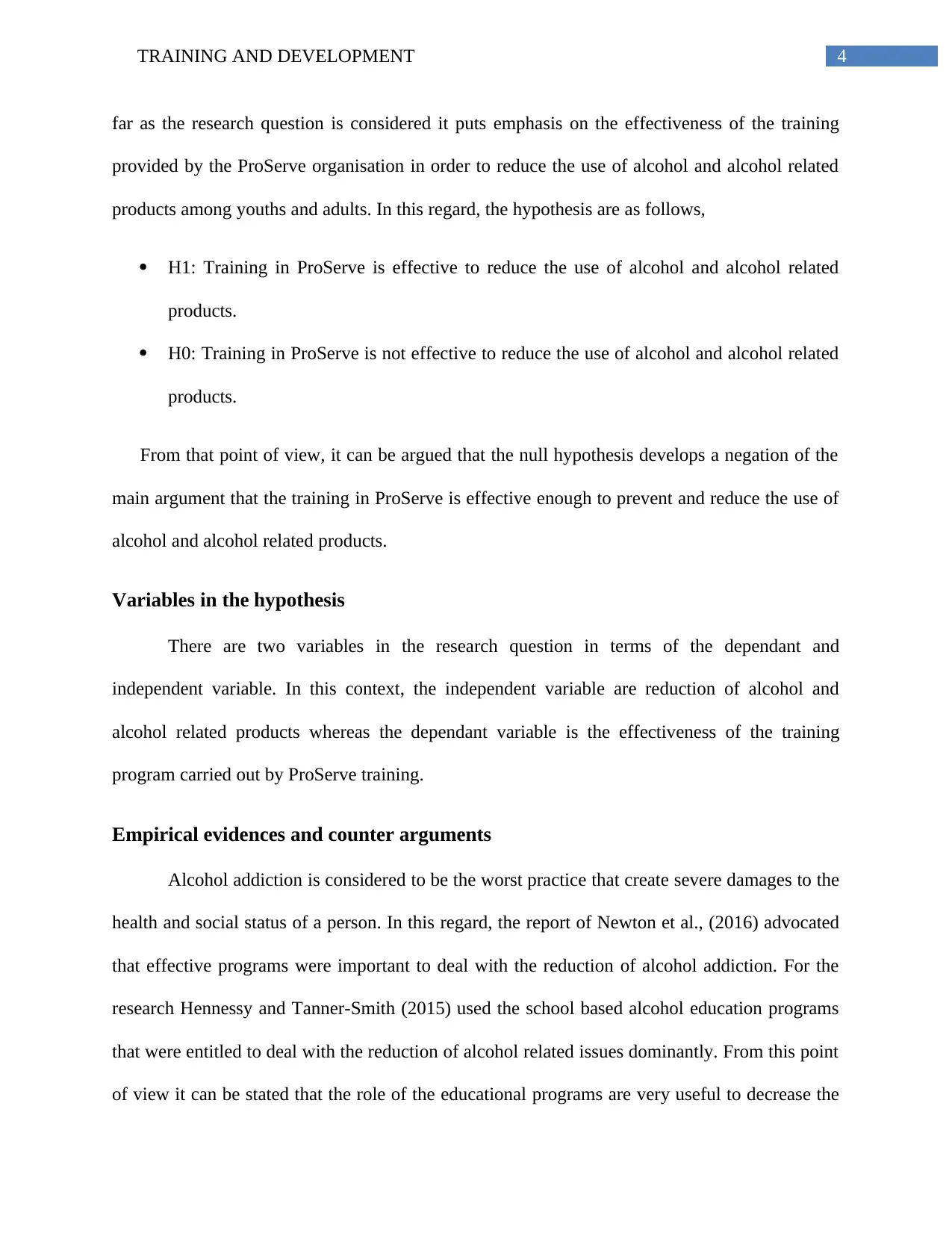
4TRAINING AND DEVELOPMENT
far as the research question is considered it puts emphasis on the effectiveness of the training
provided by the ProServe organisation in order to reduce the use of alcohol and alcohol related
products among youths and adults. In this regard, the hypothesis are as follows,
H1: Training in ProServe is effective to reduce the use of alcohol and alcohol related
products.
H0: Training in ProServe is not effective to reduce the use of alcohol and alcohol related
products.
From that point of view, it can be argued that the null hypothesis develops a negation of the
main argument that the training in ProServe is effective enough to prevent and reduce the use of
alcohol and alcohol related products.
Variables in the hypothesis
There are two variables in the research question in terms of the dependant and
independent variable. In this context, the independent variable are reduction of alcohol and
alcohol related products whereas the dependant variable is the effectiveness of the training
program carried out by ProServe training.
Empirical evidences and counter arguments
Alcohol addiction is considered to be the worst practice that create severe damages to the
health and social status of a person. In this regard, the report of Newton et al., (2016) advocated
that effective programs were important to deal with the reduction of alcohol addiction. For the
research Hennessy and Tanner-Smith (2015) used the school based alcohol education programs
that were entitled to deal with the reduction of alcohol related issues dominantly. From this point
of view it can be stated that the role of the educational programs are very useful to decrease the
far as the research question is considered it puts emphasis on the effectiveness of the training
provided by the ProServe organisation in order to reduce the use of alcohol and alcohol related
products among youths and adults. In this regard, the hypothesis are as follows,
H1: Training in ProServe is effective to reduce the use of alcohol and alcohol related
products.
H0: Training in ProServe is not effective to reduce the use of alcohol and alcohol related
products.
From that point of view, it can be argued that the null hypothesis develops a negation of the
main argument that the training in ProServe is effective enough to prevent and reduce the use of
alcohol and alcohol related products.
Variables in the hypothesis
There are two variables in the research question in terms of the dependant and
independent variable. In this context, the independent variable are reduction of alcohol and
alcohol related products whereas the dependant variable is the effectiveness of the training
program carried out by ProServe training.
Empirical evidences and counter arguments
Alcohol addiction is considered to be the worst practice that create severe damages to the
health and social status of a person. In this regard, the report of Newton et al., (2016) advocated
that effective programs were important to deal with the reduction of alcohol addiction. For the
research Hennessy and Tanner-Smith (2015) used the school based alcohol education programs
that were entitled to deal with the reduction of alcohol related issues dominantly. From this point
of view it can be stated that the role of the educational programs are very useful to decrease the
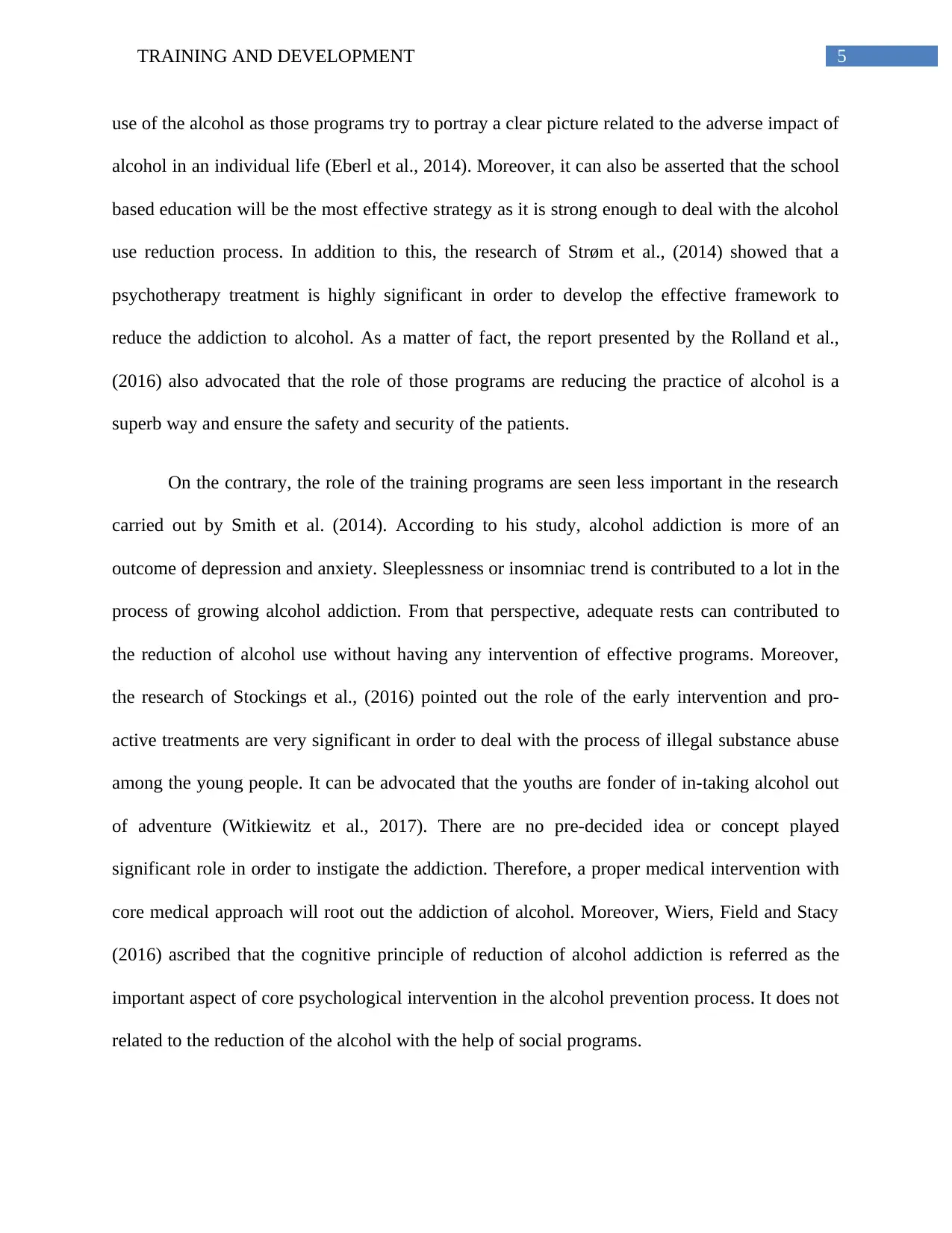
5TRAINING AND DEVELOPMENT
use of the alcohol as those programs try to portray a clear picture related to the adverse impact of
alcohol in an individual life (Eberl et al., 2014). Moreover, it can also be asserted that the school
based education will be the most effective strategy as it is strong enough to deal with the alcohol
use reduction process. In addition to this, the research of Strøm et al., (2014) showed that a
psychotherapy treatment is highly significant in order to develop the effective framework to
reduce the addiction to alcohol. As a matter of fact, the report presented by the Rolland et al.,
(2016) also advocated that the role of those programs are reducing the practice of alcohol is a
superb way and ensure the safety and security of the patients.
On the contrary, the role of the training programs are seen less important in the research
carried out by Smith et al. (2014). According to his study, alcohol addiction is more of an
outcome of depression and anxiety. Sleeplessness or insomniac trend is contributed to a lot in the
process of growing alcohol addiction. From that perspective, adequate rests can contributed to
the reduction of alcohol use without having any intervention of effective programs. Moreover,
the research of Stockings et al., (2016) pointed out the role of the early intervention and pro-
active treatments are very significant in order to deal with the process of illegal substance abuse
among the young people. It can be advocated that the youths are fonder of in-taking alcohol out
of adventure (Witkiewitz et al., 2017). There are no pre-decided idea or concept played
significant role in order to instigate the addiction. Therefore, a proper medical intervention with
core medical approach will root out the addiction of alcohol. Moreover, Wiers, Field and Stacy
(2016) ascribed that the cognitive principle of reduction of alcohol addiction is referred as the
important aspect of core psychological intervention in the alcohol prevention process. It does not
related to the reduction of the alcohol with the help of social programs.
use of the alcohol as those programs try to portray a clear picture related to the adverse impact of
alcohol in an individual life (Eberl et al., 2014). Moreover, it can also be asserted that the school
based education will be the most effective strategy as it is strong enough to deal with the alcohol
use reduction process. In addition to this, the research of Strøm et al., (2014) showed that a
psychotherapy treatment is highly significant in order to develop the effective framework to
reduce the addiction to alcohol. As a matter of fact, the report presented by the Rolland et al.,
(2016) also advocated that the role of those programs are reducing the practice of alcohol is a
superb way and ensure the safety and security of the patients.
On the contrary, the role of the training programs are seen less important in the research
carried out by Smith et al. (2014). According to his study, alcohol addiction is more of an
outcome of depression and anxiety. Sleeplessness or insomniac trend is contributed to a lot in the
process of growing alcohol addiction. From that perspective, adequate rests can contributed to
the reduction of alcohol use without having any intervention of effective programs. Moreover,
the research of Stockings et al., (2016) pointed out the role of the early intervention and pro-
active treatments are very significant in order to deal with the process of illegal substance abuse
among the young people. It can be advocated that the youths are fonder of in-taking alcohol out
of adventure (Witkiewitz et al., 2017). There are no pre-decided idea or concept played
significant role in order to instigate the addiction. Therefore, a proper medical intervention with
core medical approach will root out the addiction of alcohol. Moreover, Wiers, Field and Stacy
(2016) ascribed that the cognitive principle of reduction of alcohol addiction is referred as the
important aspect of core psychological intervention in the alcohol prevention process. It does not
related to the reduction of the alcohol with the help of social programs.
⊘ This is a preview!⊘
Do you want full access?
Subscribe today to unlock all pages.

Trusted by 1+ million students worldwide
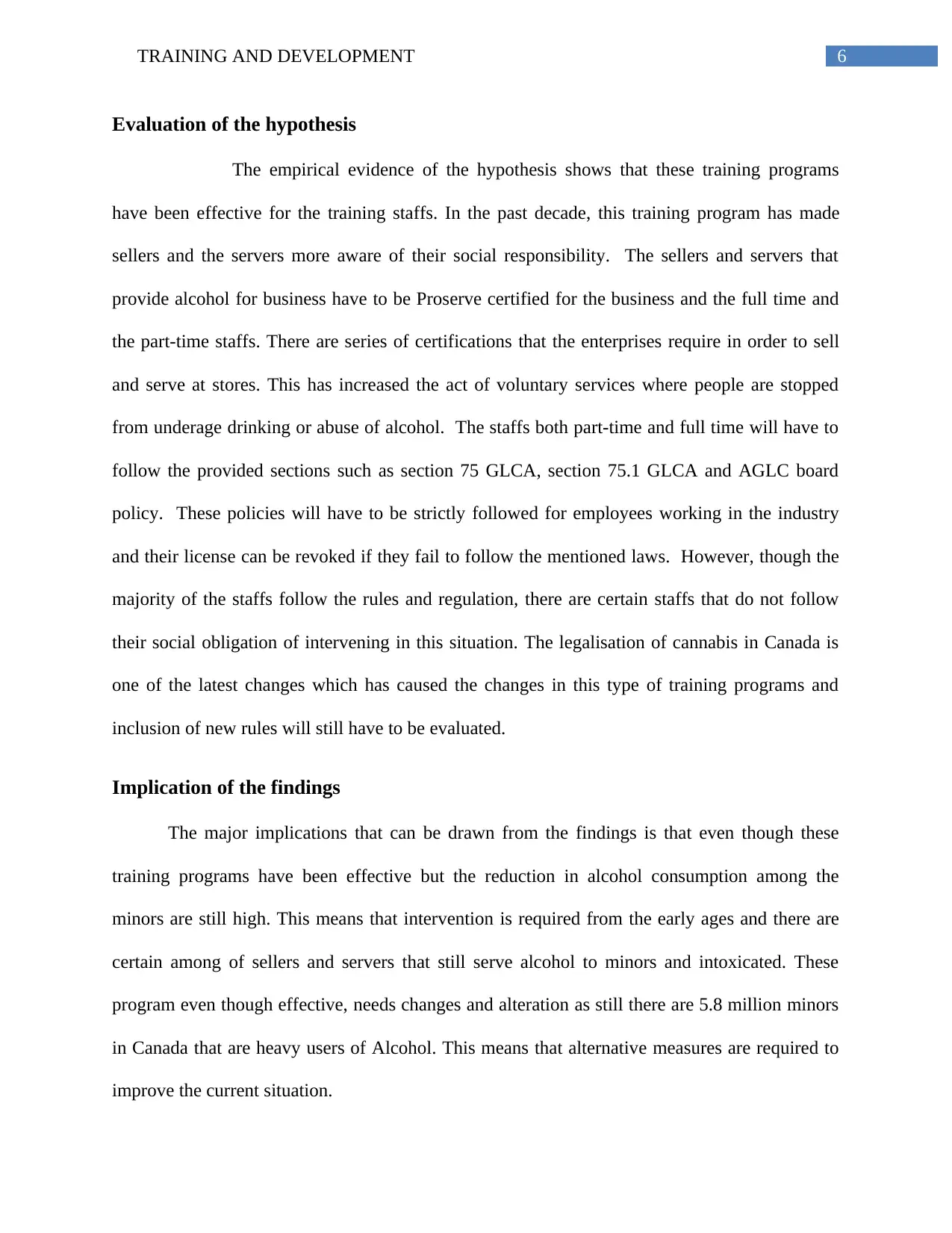
6TRAINING AND DEVELOPMENT
Evaluation of the hypothesis
The empirical evidence of the hypothesis shows that these training programs
have been effective for the training staffs. In the past decade, this training program has made
sellers and the servers more aware of their social responsibility. The sellers and servers that
provide alcohol for business have to be Proserve certified for the business and the full time and
the part-time staffs. There are series of certifications that the enterprises require in order to sell
and serve at stores. This has increased the act of voluntary services where people are stopped
from underage drinking or abuse of alcohol. The staffs both part-time and full time will have to
follow the provided sections such as section 75 GLCA, section 75.1 GLCA and AGLC board
policy. These policies will have to be strictly followed for employees working in the industry
and their license can be revoked if they fail to follow the mentioned laws. However, though the
majority of the staffs follow the rules and regulation, there are certain staffs that do not follow
their social obligation of intervening in this situation. The legalisation of cannabis in Canada is
one of the latest changes which has caused the changes in this type of training programs and
inclusion of new rules will still have to be evaluated.
Implication of the findings
The major implications that can be drawn from the findings is that even though these
training programs have been effective but the reduction in alcohol consumption among the
minors are still high. This means that intervention is required from the early ages and there are
certain among of sellers and servers that still serve alcohol to minors and intoxicated. These
program even though effective, needs changes and alteration as still there are 5.8 million minors
in Canada that are heavy users of Alcohol. This means that alternative measures are required to
improve the current situation.
Evaluation of the hypothesis
The empirical evidence of the hypothesis shows that these training programs
have been effective for the training staffs. In the past decade, this training program has made
sellers and the servers more aware of their social responsibility. The sellers and servers that
provide alcohol for business have to be Proserve certified for the business and the full time and
the part-time staffs. There are series of certifications that the enterprises require in order to sell
and serve at stores. This has increased the act of voluntary services where people are stopped
from underage drinking or abuse of alcohol. The staffs both part-time and full time will have to
follow the provided sections such as section 75 GLCA, section 75.1 GLCA and AGLC board
policy. These policies will have to be strictly followed for employees working in the industry
and their license can be revoked if they fail to follow the mentioned laws. However, though the
majority of the staffs follow the rules and regulation, there are certain staffs that do not follow
their social obligation of intervening in this situation. The legalisation of cannabis in Canada is
one of the latest changes which has caused the changes in this type of training programs and
inclusion of new rules will still have to be evaluated.
Implication of the findings
The major implications that can be drawn from the findings is that even though these
training programs have been effective but the reduction in alcohol consumption among the
minors are still high. This means that intervention is required from the early ages and there are
certain among of sellers and servers that still serve alcohol to minors and intoxicated. These
program even though effective, needs changes and alteration as still there are 5.8 million minors
in Canada that are heavy users of Alcohol. This means that alternative measures are required to
improve the current situation.
Paraphrase This Document
Need a fresh take? Get an instant paraphrase of this document with our AI Paraphraser
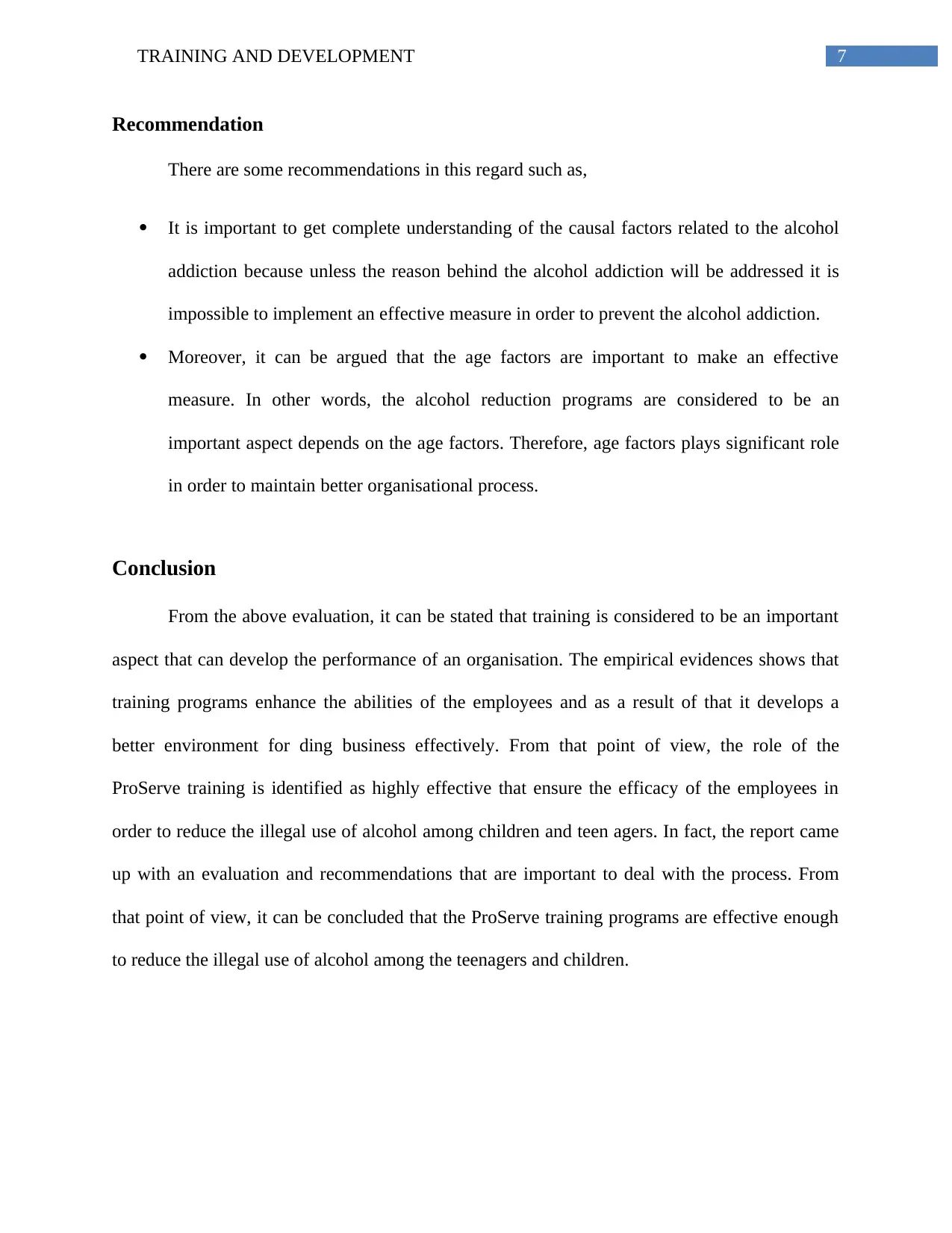
7TRAINING AND DEVELOPMENT
Recommendation
There are some recommendations in this regard such as,
It is important to get complete understanding of the causal factors related to the alcohol
addiction because unless the reason behind the alcohol addiction will be addressed it is
impossible to implement an effective measure in order to prevent the alcohol addiction.
Moreover, it can be argued that the age factors are important to make an effective
measure. In other words, the alcohol reduction programs are considered to be an
important aspect depends on the age factors. Therefore, age factors plays significant role
in order to maintain better organisational process.
Conclusion
From the above evaluation, it can be stated that training is considered to be an important
aspect that can develop the performance of an organisation. The empirical evidences shows that
training programs enhance the abilities of the employees and as a result of that it develops a
better environment for ding business effectively. From that point of view, the role of the
ProServe training is identified as highly effective that ensure the efficacy of the employees in
order to reduce the illegal use of alcohol among children and teen agers. In fact, the report came
up with an evaluation and recommendations that are important to deal with the process. From
that point of view, it can be concluded that the ProServe training programs are effective enough
to reduce the illegal use of alcohol among the teenagers and children.
Recommendation
There are some recommendations in this regard such as,
It is important to get complete understanding of the causal factors related to the alcohol
addiction because unless the reason behind the alcohol addiction will be addressed it is
impossible to implement an effective measure in order to prevent the alcohol addiction.
Moreover, it can be argued that the age factors are important to make an effective
measure. In other words, the alcohol reduction programs are considered to be an
important aspect depends on the age factors. Therefore, age factors plays significant role
in order to maintain better organisational process.
Conclusion
From the above evaluation, it can be stated that training is considered to be an important
aspect that can develop the performance of an organisation. The empirical evidences shows that
training programs enhance the abilities of the employees and as a result of that it develops a
better environment for ding business effectively. From that point of view, the role of the
ProServe training is identified as highly effective that ensure the efficacy of the employees in
order to reduce the illegal use of alcohol among children and teen agers. In fact, the report came
up with an evaluation and recommendations that are important to deal with the process. From
that point of view, it can be concluded that the ProServe training programs are effective enough
to reduce the illegal use of alcohol among the teenagers and children.
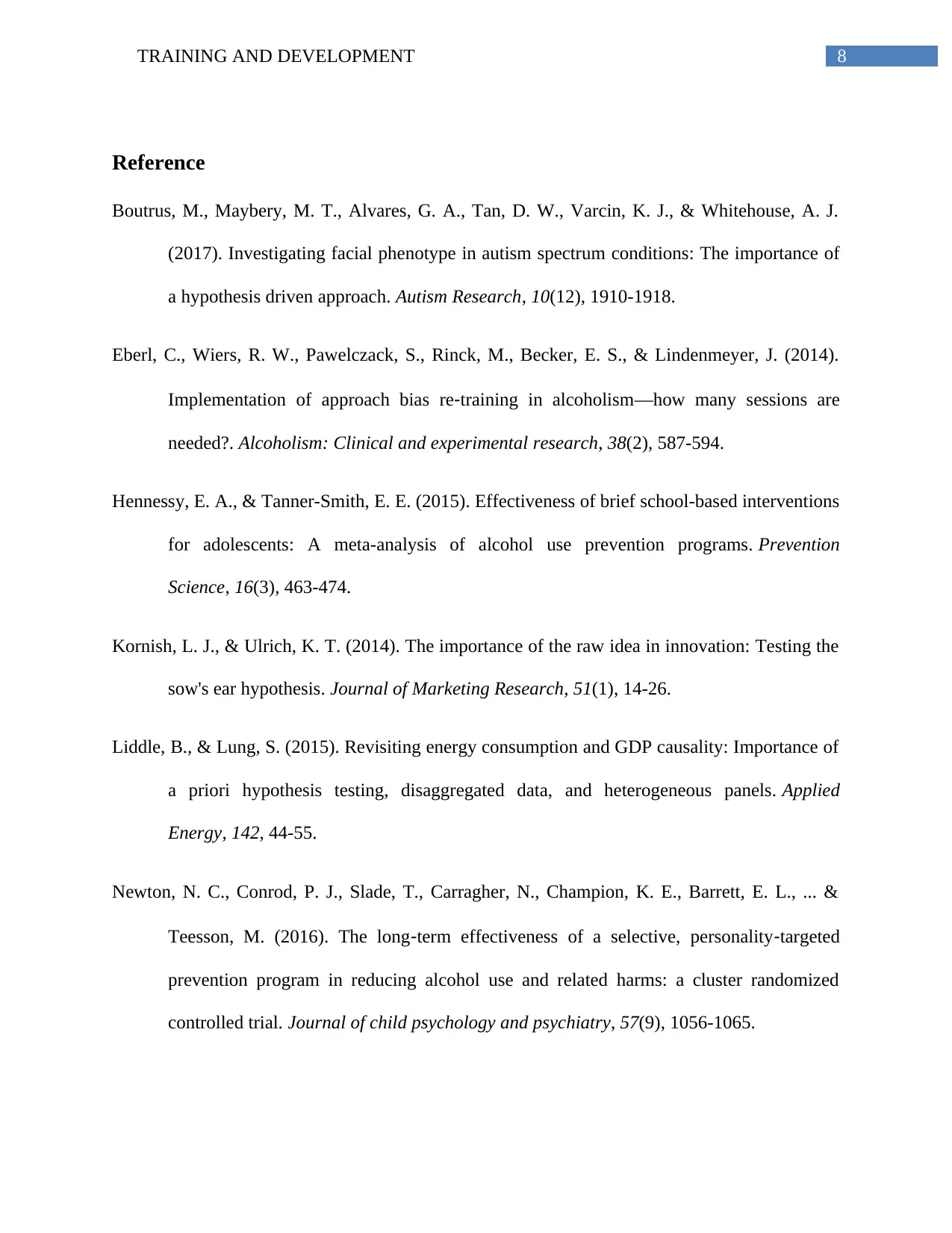
8TRAINING AND DEVELOPMENT
Reference
Boutrus, M., Maybery, M. T., Alvares, G. A., Tan, D. W., Varcin, K. J., & Whitehouse, A. J.
(2017). Investigating facial phenotype in autism spectrum conditions: The importance of
a hypothesis driven approach. Autism Research, 10(12), 1910-1918.
Eberl, C., Wiers, R. W., Pawelczack, S., Rinck, M., Becker, E. S., & Lindenmeyer, J. (2014).
Implementation of approach bias re‐training in alcoholism—how many sessions are
needed?. Alcoholism: Clinical and experimental research, 38(2), 587-594.
Hennessy, E. A., & Tanner-Smith, E. E. (2015). Effectiveness of brief school-based interventions
for adolescents: A meta-analysis of alcohol use prevention programs. Prevention
Science, 16(3), 463-474.
Kornish, L. J., & Ulrich, K. T. (2014). The importance of the raw idea in innovation: Testing the
sow's ear hypothesis. Journal of Marketing Research, 51(1), 14-26.
Liddle, B., & Lung, S. (2015). Revisiting energy consumption and GDP causality: Importance of
a priori hypothesis testing, disaggregated data, and heterogeneous panels. Applied
Energy, 142, 44-55.
Newton, N. C., Conrod, P. J., Slade, T., Carragher, N., Champion, K. E., Barrett, E. L., ... &
Teesson, M. (2016). The long‐term effectiveness of a selective, personality‐targeted
prevention program in reducing alcohol use and related harms: a cluster randomized
controlled trial. Journal of child psychology and psychiatry, 57(9), 1056-1065.
Reference
Boutrus, M., Maybery, M. T., Alvares, G. A., Tan, D. W., Varcin, K. J., & Whitehouse, A. J.
(2017). Investigating facial phenotype in autism spectrum conditions: The importance of
a hypothesis driven approach. Autism Research, 10(12), 1910-1918.
Eberl, C., Wiers, R. W., Pawelczack, S., Rinck, M., Becker, E. S., & Lindenmeyer, J. (2014).
Implementation of approach bias re‐training in alcoholism—how many sessions are
needed?. Alcoholism: Clinical and experimental research, 38(2), 587-594.
Hennessy, E. A., & Tanner-Smith, E. E. (2015). Effectiveness of brief school-based interventions
for adolescents: A meta-analysis of alcohol use prevention programs. Prevention
Science, 16(3), 463-474.
Kornish, L. J., & Ulrich, K. T. (2014). The importance of the raw idea in innovation: Testing the
sow's ear hypothesis. Journal of Marketing Research, 51(1), 14-26.
Liddle, B., & Lung, S. (2015). Revisiting energy consumption and GDP causality: Importance of
a priori hypothesis testing, disaggregated data, and heterogeneous panels. Applied
Energy, 142, 44-55.
Newton, N. C., Conrod, P. J., Slade, T., Carragher, N., Champion, K. E., Barrett, E. L., ... &
Teesson, M. (2016). The long‐term effectiveness of a selective, personality‐targeted
prevention program in reducing alcohol use and related harms: a cluster randomized
controlled trial. Journal of child psychology and psychiatry, 57(9), 1056-1065.
⊘ This is a preview!⊘
Do you want full access?
Subscribe today to unlock all pages.

Trusted by 1+ million students worldwide
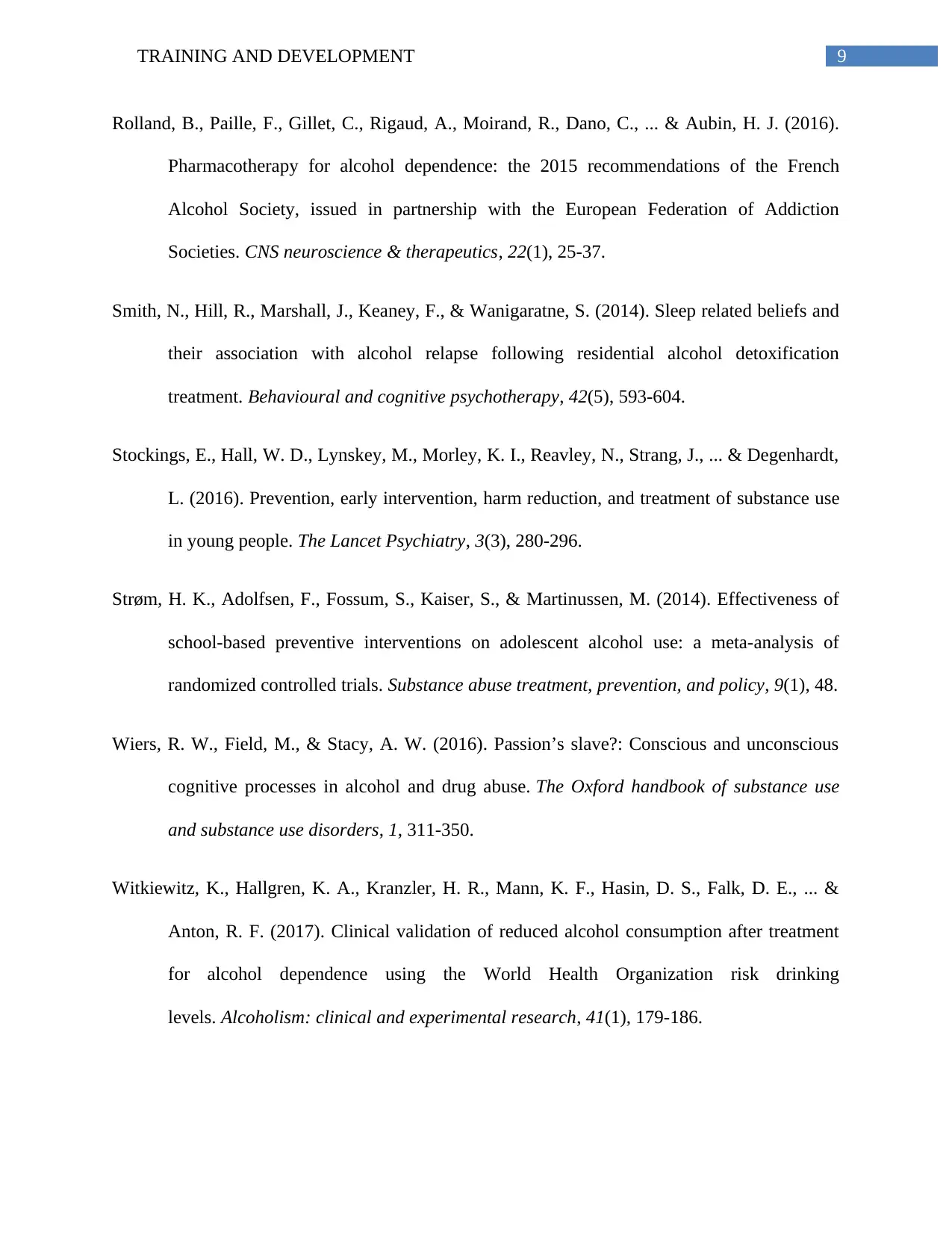
9TRAINING AND DEVELOPMENT
Rolland, B., Paille, F., Gillet, C., Rigaud, A., Moirand, R., Dano, C., ... & Aubin, H. J. (2016).
Pharmacotherapy for alcohol dependence: the 2015 recommendations of the French
Alcohol Society, issued in partnership with the European Federation of Addiction
Societies. CNS neuroscience & therapeutics, 22(1), 25-37.
Smith, N., Hill, R., Marshall, J., Keaney, F., & Wanigaratne, S. (2014). Sleep related beliefs and
their association with alcohol relapse following residential alcohol detoxification
treatment. Behavioural and cognitive psychotherapy, 42(5), 593-604.
Stockings, E., Hall, W. D., Lynskey, M., Morley, K. I., Reavley, N., Strang, J., ... & Degenhardt,
L. (2016). Prevention, early intervention, harm reduction, and treatment of substance use
in young people. The Lancet Psychiatry, 3(3), 280-296.
Strøm, H. K., Adolfsen, F., Fossum, S., Kaiser, S., & Martinussen, M. (2014). Effectiveness of
school-based preventive interventions on adolescent alcohol use: a meta-analysis of
randomized controlled trials. Substance abuse treatment, prevention, and policy, 9(1), 48.
Wiers, R. W., Field, M., & Stacy, A. W. (2016). Passion’s slave?: Conscious and unconscious
cognitive processes in alcohol and drug abuse. The Oxford handbook of substance use
and substance use disorders, 1, 311-350.
Witkiewitz, K., Hallgren, K. A., Kranzler, H. R., Mann, K. F., Hasin, D. S., Falk, D. E., ... &
Anton, R. F. (2017). Clinical validation of reduced alcohol consumption after treatment
for alcohol dependence using the World Health Organization risk drinking
levels. Alcoholism: clinical and experimental research, 41(1), 179-186.
Rolland, B., Paille, F., Gillet, C., Rigaud, A., Moirand, R., Dano, C., ... & Aubin, H. J. (2016).
Pharmacotherapy for alcohol dependence: the 2015 recommendations of the French
Alcohol Society, issued in partnership with the European Federation of Addiction
Societies. CNS neuroscience & therapeutics, 22(1), 25-37.
Smith, N., Hill, R., Marshall, J., Keaney, F., & Wanigaratne, S. (2014). Sleep related beliefs and
their association with alcohol relapse following residential alcohol detoxification
treatment. Behavioural and cognitive psychotherapy, 42(5), 593-604.
Stockings, E., Hall, W. D., Lynskey, M., Morley, K. I., Reavley, N., Strang, J., ... & Degenhardt,
L. (2016). Prevention, early intervention, harm reduction, and treatment of substance use
in young people. The Lancet Psychiatry, 3(3), 280-296.
Strøm, H. K., Adolfsen, F., Fossum, S., Kaiser, S., & Martinussen, M. (2014). Effectiveness of
school-based preventive interventions on adolescent alcohol use: a meta-analysis of
randomized controlled trials. Substance abuse treatment, prevention, and policy, 9(1), 48.
Wiers, R. W., Field, M., & Stacy, A. W. (2016). Passion’s slave?: Conscious and unconscious
cognitive processes in alcohol and drug abuse. The Oxford handbook of substance use
and substance use disorders, 1, 311-350.
Witkiewitz, K., Hallgren, K. A., Kranzler, H. R., Mann, K. F., Hasin, D. S., Falk, D. E., ... &
Anton, R. F. (2017). Clinical validation of reduced alcohol consumption after treatment
for alcohol dependence using the World Health Organization risk drinking
levels. Alcoholism: clinical and experimental research, 41(1), 179-186.
1 out of 10
Related Documents
Your All-in-One AI-Powered Toolkit for Academic Success.
+13062052269
info@desklib.com
Available 24*7 on WhatsApp / Email
![[object Object]](/_next/static/media/star-bottom.7253800d.svg)
Unlock your academic potential
Copyright © 2020–2026 A2Z Services. All Rights Reserved. Developed and managed by ZUCOL.



